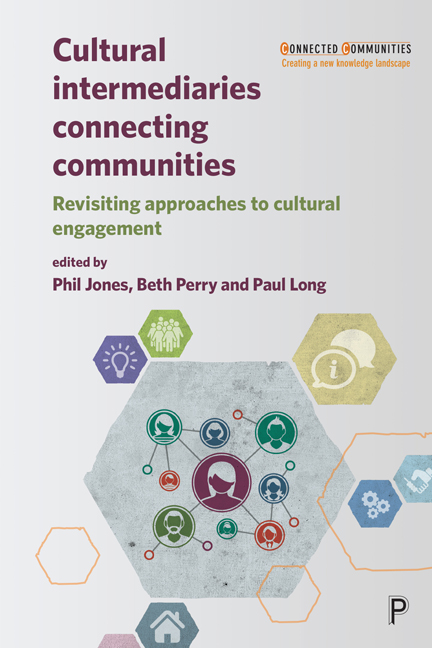Book contents
- Frontmatter
- Contents
- List of figures, tables and boxes
- Notes on contributors
- Acknowledgements
- Series editors’ foreword
- Introduction: Bringing communities and culture together
- Part One Changing contexts
- Part Two Practices of cultural intermediation
- Part Three Evaluation, impact and methodology
- Conclusion: where next for cultural intermediation?
- Index
four - State-sponsored amateurism: cultural intermediation, participation and non-professional production
Published online by Cambridge University Press: 30 April 2022
- Frontmatter
- Contents
- List of figures, tables and boxes
- Notes on contributors
- Acknowledgements
- Series editors’ foreword
- Introduction: Bringing communities and culture together
- Part One Changing contexts
- Part Two Practices of cultural intermediation
- Part Three Evaluation, impact and methodology
- Conclusion: where next for cultural intermediation?
- Index
Summary
Introduction
In the summer of 2015, in the course of the Cultural intermediation project, researchers came across a Salford redevelopment site surrounded by a woodchip board wall. These cheap fences are of a kind now de rigueur in urban locations, used for concealing disruptions and abject spaces: panels are often painted and laboriously repainted as they attract the unsanctioned attention and graffiti of ‘taggers’ (Carrington, 2009). As a consequence, or out of recognition for the alienating effect of these enclosures, those responsible for them sometimes enlist cultural intermediaries to organise a more acceptable decoration, so creating sites of officially sanctioned, if temporary, public art. For instance, in the same period at the project’s other research site in Balsall Heath, Birmingham, professional graffiti artist Mohammed Ali of the organisation Soul City Arts decorated a similar wall that disguised derelict ground and a junkyard (see Chapter fourteen). Taking a cue from local residents, Ali produced a spectacular work that conveyed in symbolic manner the area's industrial heritage and the impact upon it of post-war migrant settlement (Long, 2014). By way of contrast, Salford's wall was ‘hung’ with reproductions of artworks produced by non-professionals drawn from the local community. This material conveyed a range of representations of the area, including ideas for its improvement, perhaps anticipating with a welcome or criticism the building to be revealed behind the wall (author's field notes).
In time, both walls came down. Although weathered and partially destroyed, parts of Ali's mural remain visible on Balsall Heath’s Ladypool Road; despite its ephemerality, the art is recorded on his website as part of his portfolio, thus underwriting the value and guarantee of his name and expertise. Salford's wall reached the end of its practical usefulness with the completion of the construction it had concealed. As researchers later observed, the ‘gallery’ of reproductions the wall had presented was discarded with it (author's field notes). No record appears to exist of the impulse behind the Salford project, nor what became of the original contributions from the community. Nonetheless, both projects were visible examples of contemporary cultural intermediation processes, aestheticising urban space, speaking with and about the communities in which they were situated.
- Type
- Chapter
- Information
- Cultural Intermediaries Connecting CommunitiesRevisiting Approaches to Cultural Engagement, pp. 77 - 94Publisher: Bristol University PressPrint publication year: 2019



